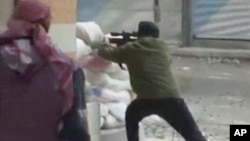Syrian rebels say they plan to seize Damascus International Airport, declaring it a legitimate target in their fight to topple President Bashar al-Assad.
A rebel commander said Friday attacks on the airport are justified because it is being used as a military zone. He said civilians should avoid the area. It was unclear just how close to the airport the battles had reached.
Fighting has intensified in the past week in the southern districts of the Syrian capital and its suburbs.
Sarin
VX
Mustard Gas
Source: CDC
Earlier Friday, Syrian activists said the army had bombed two Damascus suburbs and increased reinforcements in an effort to try to reclaim territory controlled by rebels.
The Syrian Observatory for Human Rights said the army fired rockets at the rebel-held Daraya and Moadamiah suburbs southwest of the capital. The group said it feared that troops massing on the suburbs' outskirts could be the prelude to an imminent ground assault.
Source: UNHCR
Also Friday, U.S. Secretary of State Hillary Clinton said American and Russian officials will meet in the next few days to find ways to work together to end the violence in Syria.
Clinton said there was no "breakthrough" during talks Thursday in Ireland with Russian Foreign Minister Sergei Lavrov and special United Nations and Arab League envoy Lakhtar Brahimi. But she said they did agree to form lower-level teams to work with Brahimi on possible ways to end the violence.
Russia and the United States have been on opposite sides of the more than year-long conflict.
Clinton stressed that it is important for any country with influence in the Middle East to explore all possible solutions, because developments in Syria are "increasingly dangerous not only to Syrians, but to their neighbors."
Meanwhile, U.S. Defense Secretary Leon Panetta said intelligence shows Assad may be considering using chemical weapons, as rebel successes in the civil war put increasing pressure on his government.
The White House has warned Assad that using chemical gas against his own people would be a "red line" for the United States and bring serious consequences.
United Nations Secretary-General Ban Ki-moon said Friday using such weapons would be an "outrageous crime."
Syrian Deputy Foreign Minister Faisal Maqdad has told Lebanese TV that if Syria had chemical weapons, it would not use them against the Syrian people. He said the West is using the threat of chemical weapons as an excuse to intervene.
A rebel commander said Friday attacks on the airport are justified because it is being used as a military zone. He said civilians should avoid the area. It was unclear just how close to the airport the battles had reached.
Fighting has intensified in the past week in the southern districts of the Syrian capital and its suburbs.
Suspected Syrian Chemical Weapons
Suspected Syrian Chemical WeaponsSarin
- Man-made highly toxic odorless, tasteless, colorless nerve agent
- Possibly used during Iraq-Iran war
- Exposure can be by inhalation, ingestion and skin absorption; people can recover with treatment form mild or moderate exposure
VX
- Odorless, tasteless man-made nerve agent; most potent of all nerve agents
- Slow to evaporate, can last for days on objects
- Exposure can be through skin contact or inhalation; people can recover with treatment for mild or moderate exposure
Mustard Gas
- Chemical warfare agent that causes skin blisters and mucous membranes
- Sometimes odorless, sometimes smells like garlic, onions or mustard
- Exposure can be by inhalation, ingestion or skin contact
- Vapor released in the air can be carried long distances; exposure not usually fatal
Source: CDC
Earlier Friday, Syrian activists said the army had bombed two Damascus suburbs and increased reinforcements in an effort to try to reclaim territory controlled by rebels.
The Syrian Observatory for Human Rights said the army fired rockets at the rebel-held Daraya and Moadamiah suburbs southwest of the capital. The group said it feared that troops massing on the suburbs' outskirts could be the prelude to an imminent ground assault.
Syrian Refugees by Country
Syrian Refugees by Country| Jordan | 448,370 |
| Lebanon | 455,665 |
| Turkey | 324,770 |
| Iraq | 142,395 |
| Egypt | 62,032 |
Source: UNHCR
Clinton said there was no "breakthrough" during talks Thursday in Ireland with Russian Foreign Minister Sergei Lavrov and special United Nations and Arab League envoy Lakhtar Brahimi. But she said they did agree to form lower-level teams to work with Brahimi on possible ways to end the violence.
Russia and the United States have been on opposite sides of the more than year-long conflict.
Clinton stressed that it is important for any country with influence in the Middle East to explore all possible solutions, because developments in Syria are "increasingly dangerous not only to Syrians, but to their neighbors."
Meanwhile, U.S. Defense Secretary Leon Panetta said intelligence shows Assad may be considering using chemical weapons, as rebel successes in the civil war put increasing pressure on his government.
The White House has warned Assad that using chemical gas against his own people would be a "red line" for the United States and bring serious consequences.
United Nations Secretary-General Ban Ki-moon said Friday using such weapons would be an "outrageous crime."
Syrian Deputy Foreign Minister Faisal Maqdad has told Lebanese TV that if Syria had chemical weapons, it would not use them against the Syrian people. He said the West is using the threat of chemical weapons as an excuse to intervene.





